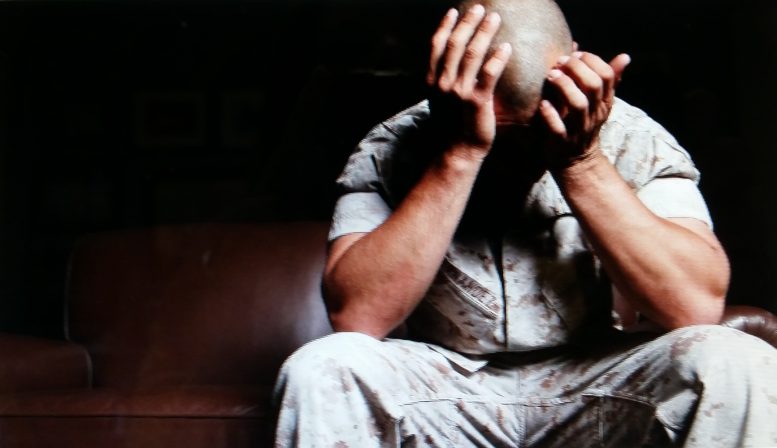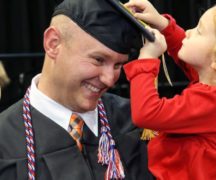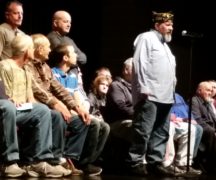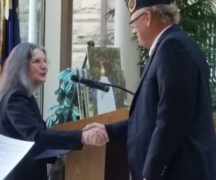By JAN LARSON McLAUGHLIN
BG Independent News
As many as 25 percent of the U.S. veterans who served in Iraq and Afghanistan returned home with traumatic brain injuries. Thirty percent came back with post traumatic stress disorder.
In Wood County, it’s estimated that 60 veterans are now living with the effects of TBI or PTSD. Many of the traumatic brain injuries were caused by IEDs (improvised explosive devices) frequently used in recent wars.
So when Mary Hanna, executive director of the Wood County Veterans Assistance Center, got a call offering her office a $10,000 grant to help treat those problems, she jumped at the chance.
“It was very humbling. We will be the first county office to receive funds to do this,” Hanna said.
The need is great, she said. “TBI and PTSD dramatically impacts their ability to get through daily functions,” at school, on the job, and with their families.
Hanna contacted the Speech and Hearing Clinic at Bowling Green State University, and a partnership was formed to use the grant to help local veterans.
“I’m getting ready to notify each veteran about these services,” which will be offered at no cost, Hanna said of the 12,895 veterans living in Wood County.
The grant came from Dr. Chrisanne Gordon, founder of the Resurrecting Lives Foundation, who has made it her mission to get better care for veterans returning home with the often invisible injuries of TBI and PTSD.
In many cases, veterans who served in Iraq and Afghanistan went right from school to war, Gordon said. They never had to navigate in society before – and now some are faced with doing that with a TBI or PTSD. Services to treat such injuries by veterans organizations are still lagging, she said.
“It’s not well diagnosed and treated in the civilian world. It’s like the new global epidemic,” she said. “It’s only in the last decade that we can see well inside the brain.”
Some Vietnam veterans are just now realizing that they have been living with PTSD. “I don’t want that to happen with this generation,” Gordon said.
“If you have a brain that has difficulty navigating,” normal challenges can seem impossible, she said. So Gordon decided she wanted to “bring brain treatment to them.”
The services at the BGSU Speech and Hearing Clinic can help veterans with TBI and PTSD with the following issues:
- Memory issues.
- Understanding speech, especially in noisy or complicated situations.
- Reading comprehension, especially for complex materials.
- Problem solving, decision-making, planning and organization.
- Social communication challenges.
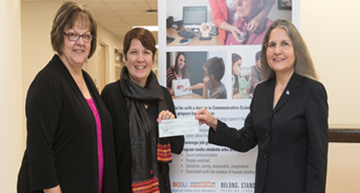
Donna Colcord and Lynne Hewitt accept check from Mary Hanna.
The $10,000 grant is intended to help up to 20 veterans with 15 one-hour treatment sessions, with the option to continue. Each vet will get a comprehensive evaluation of speech-language-cognitive functioning which will be used to create a treatment plan individualized for specific needs and personal goals. Complete hearing evaluations will also be available.
Hanna stressed that these services won’t interview with regular VA services. “These are in addition to the services they are receiving as a VA patient,” she said.
Though the services will be offered on the BGSU campus, they will be open to any veterans, Gordon said.
“This is not just for students. It will give veterans a safe place to get treatment where it’s confidential,” she said.
The conditions created by TBI can be “unforgiving,” Gordon said. If not treated, they can include substance abuse, unemployment, homelessness, incarceration and suicide. “Treating TBI and PTSD is a necessity, not an option,” according to the Ressurecting Lives Foundation.
Hanna has been working to set up the program at the BGSU Speech and Hearing Clinic with Lynne Hewitt, department chair, and Donna Colcord, clinic director.
“It’s going to offer them the ability to work on areas they are having difficulty with in day-to-day functions,” Colcord said. “It’s going to help them to be successful.”
The Speech and Hearing Clinic has worked with individuals with cognitive disorders, but this will be the first time to work on such a project with veterans.
“We are super, super excited to work with the veterans,” Colcord said, describing them as an underserved population. “Oftentimes it’s not identified until they are having problems with their day-to-day functioning.”
Hewitt said the clinic will offer assessment and treatment for the veterans.
“We support individuals with these kind of brain injuries,” she said.
Another side benefit of the program will be the interaction between students and veterans, Hewitt said. “Students will be getting exposure to this population.”
And ultimately, the program will help veterans with often invisible injuries, Gordon said.
“Our veterans have no voice,” she said. “You literally cannot fight through the VA system.”

